
Sir Alfred Joseph Hitchcock was an English film director. He is widely regarded as one of the most influential figures in the history of cinema. In a career spanning six decades, he directed over 50 feature films, many of which are still widely watched and studied today. Known as the "Master of Suspense", Hitchcock became as well known as any of his actors thanks to his many interviews, his cameo appearances in most of his films, and his hosting and producing the television anthology Alfred Hitchcock Presents (1955–65). His films garnered 46 Academy Award nominations, including six wins, although he never won the award for Best Director, despite five nominations.
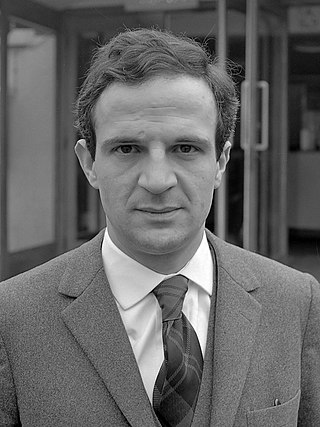
François Roland Truffaut was a French filmmaker, actor, and critic. He is widely regarded as one of the founders of the French New Wave. With a career of more than 25 years, he is an icon of the French film industry.

Psycho is a 1960 American horror film produced and directed by Alfred Hitchcock. The screenplay, written by Joseph Stefano, was based on the 1959 novel of the same name by Robert Bloch. The film stars Anthony Perkins, Janet Leigh, Vera Miles, John Gavin, and Martin Balsam. The plot centers on an encounter between on-the-run embezzler Marion Crane (Leigh) and shy motel proprietor Norman Bates (Perkins) and its aftermath, in which a private investigator (Balsam), Marion's lover Sam Loomis (Gavin), and her sister Lila (Miles) investigate her disappearance.

North by Northwest is a 1959 American spy thriller film produced and directed by Alfred Hitchcock, and starring Cary Grant, Eva Marie Saint, and James Mason. The screenplay was by Ernest Lehman, who wanted to write "the Hitchcock picture to end all Hitchcock pictures".

Rear Window is a 1954 American mystery horror film directed by Alfred Hitchcock and written by John Michael Hayes based on Cornell Woolrich's 1942 short story It Had to Be Murder. Originally released by Paramount Pictures, the film stars James Stewart, Grace Kelly, Wendell Corey, Thelma Ritter, and Raymond Burr. It was screened at the 1954 Venice Film Festival.
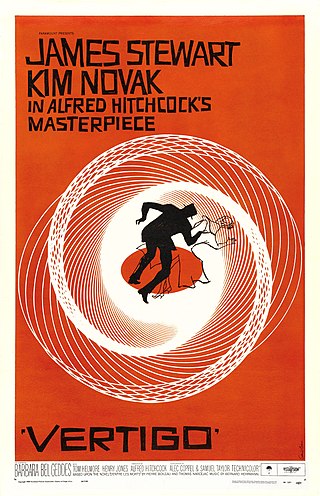
Vertigo is a 1958 American psychological thriller film directed and produced by Alfred Hitchcock. The story was based on the 1954 novel D'entre les morts by Boileau-Narcejac, with a screenplay by Alec Coppel and Samuel A. Taylor. The film stars James Stewart as a former San Francisco police detective who has retired after an incident in the line of duty caused him to develop an extreme fear of heights accompanied by vertigo. He is hired as a private investigator to report on the strange behavior of an acquaintance's wife.
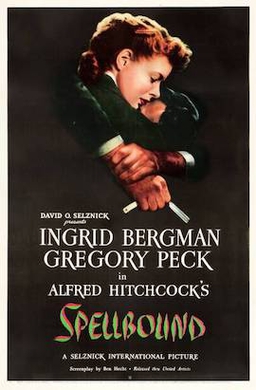
Spellbound is a 1945 American psychological thriller directed by Alfred Hitchcock, and starring Ingrid Bergman, Gregory Peck, and Michael Chekhov. It follows a psychoanalyst who falls in love with the new head of the Vermont hospital in which she works, only to find that he is an imposter suffering dissociative amnesia, and potentially, a murderer. The film is based on the 1927 novel The House of Dr. Edwardes by Hilary Saint George Saunders and John Palmer.

John Towner Williams is an American composer and conductor. In a career that has spanned seven decades, he has composed some of the most popular, recognizable, and critically acclaimed film scores in cinema history. He has a distinct sound that mixes romanticism, impressionism, and atonal music with complex orchestration. He is best known for his collaborations with Steven Spielberg and George Lucas and has received numerous accolades including 26 Grammy Awards, five Academy Awards, seven BAFTA Awards, three Emmy Awards, and four Golden Globe Awards. With 54 Academy Award nominations, he is the second-most nominated person, after Walt Disney, and is the oldest Oscar nominee in any category, at 91 years old.
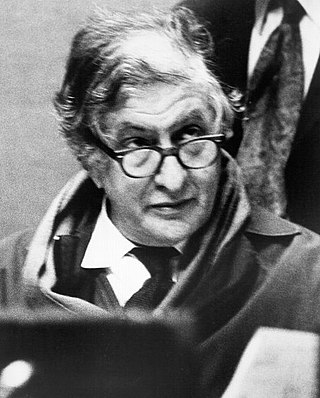
Bernard Herrmann was an American composer and conductor best known for his work in composing for films. As a conductor, he championed the music of lesser-known composers. He is widely regarded as one of the greatest film composers. Alex Ross writes that "Over four decades, he revolutionized movie scoring by abandoning the illustrative musical techniques that dominated Hollywood in the 1930s and imposing his own peculiar harmonic and rhythmic vocabulary."

Thomas Morgan Robertson, known by the stage name Thomas Dolby, is an English musician, producer, composer, entrepreneur and teacher.
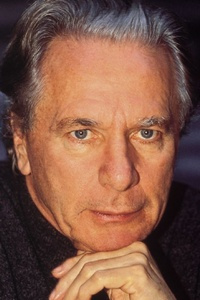
Maurice-Alexis Jarre was a French composer and conductor. Jarre is best known for his film scores, particularly for his collaborations with film director David Lean composing all of his films from 1962 to 1984. Jarre has received numerous accolades including three Academy Awards, three BAFTA Awards, four Golden Globes, and a Grammy Award.

Day for Night is a 1973 romantic comedy-drama film co-written and directed by François Truffaut. The metafictional and self-reflexive film chronicles the troubled production of a melodrama, and the various personal and professional challenges of the cast and crew. It stars Jacqueline Bisset, Valentina Cortese, Jean-Pierre Aumont, Dani, Alexandra Stewart, Jean-Pierre Léaud and Truffaut himself.

Waltzes from Vienna is a 1934 British biographical film directed by Alfred Hitchcock, sometimes known as Strauss' Great Waltz. It was part of the cycle of operetta films made in Britain during the 1930s.
Rachel Mary Berkeley Portman is a British composer who made history in 1996 for being the first female composer to win an Academy Award for the Best Original Score, for Emma. She was also nominated twice, for the soundtracks of The Cider House Rules (1999) and Chocolat (2000). She was awarded the Order of the British Empire in 2010, and is an honorary member of Worcester College, Oxford. She has composed more than one hundred scores for film, television and theatre, and has collaborated with the BBC on several projects, including an opera based on The Little Prince and a choral symphony called The Water Diviner.

The Man Who Knew Too Much is a 1934 British spy thriller film directed by Alfred Hitchcock, featuring Leslie Banks and Peter Lorre, and released by Gaumont British. It was one of the most successful and critically acclaimed films of Hitchcock's British period.

The Man Who Knew Too Much is a 1956 American mystery thriller film directed and produced by Alfred Hitchcock, starring James Stewart and Doris Day. It is Hitchcock's second film using this title, following his own 1934 film of the same name but featuring a significantly altered plot and script.
Audrey Wood Breaux, better known as Dee Dee Wood, was an American choreographer. She was best known for her work on musical films of the 1960s and 1970s, especially for The Sound of Music, one of the highest-grossing musicals of all time.
An auteur is an artist with a distinctive approach, usually a film director whose filmmaking control is so unbounded and personal that the director is likened to the "author" of the film, thus manifesting the director's unique style or thematic focus. As an unnamed value, auteurism originated in French film criticism of the late 1940s, and derives from the critical approach of André Bazin and Alexandre Astruc, whereas American critic Andrew Sarris in 1962 called it auteur theory. Yet the concept first appeared in French in 1955 when director François Truffaut termed it policy of the authors, and interpreted the films of some directors, like Alfred Hitchcock, as a body revealing recurring themes and preoccupations.

Michael Price is an English composer and pianist. Prior to establishing himself as a composer, he held a number of roles within the TV & film music field such as producer, arranger and music editor, much of which whilst working alongside acclaimed film score composer Michael Kamen.

Hitchcock/Truffaut is a 1966 book by François Truffaut about Alfred Hitchcock, originally released in French as Le Cinéma selon Alfred Hitchcock.
















